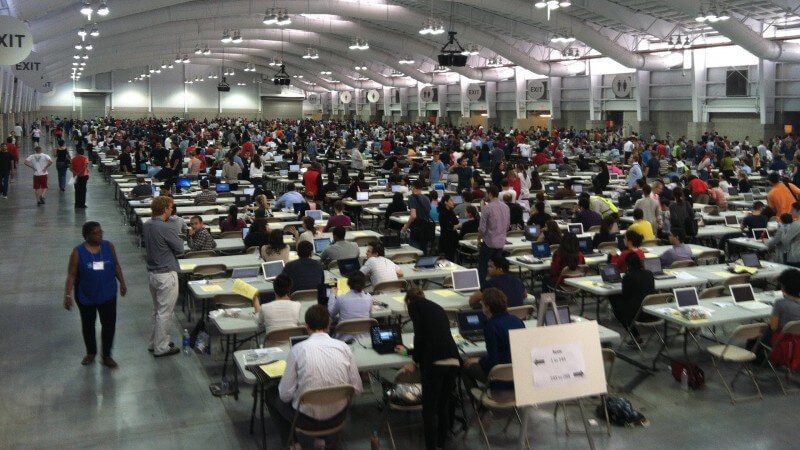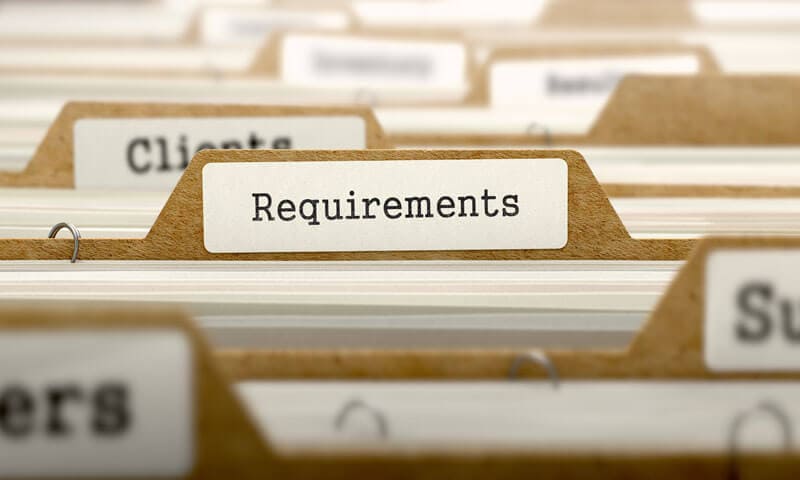Summary: FAQ about the bar exam and state bar admissions.
Taking the bar exam is a task that every attorney has to endure at least once, and last July’s exam proved that it is one that many aspiring lawyers still struggle with. While overall we saw an uptick in scores nationally from the year before, the pass rate for July 2016 was still at an all-time low, with some states such as California showing a performance that could be described as nothing but abysmal. With the February bar exam quickly approaching, many candidates have questions about this career-affecting test, and the following is a detailed guide to everything you need to know about the bar exam and state admission requirements.
What is on the bar exam?
The bar exam is a state-administered test that is used to determine a candidate’s competency to practice law in that jurisdiction. It is administered in February and July of each year, and it usually takes place over two days, although some states give the test over three days. (For a state-by-state guide about test length, click here.)
The bar exam is broken up into essay and multiple choice sections. While some states such as Pennsylvania choose to give their own state-specific tests, most states administer exams created by the National Conference of Bar Examiners, a non-profit that develops tests to measure legal aptitude and character and fitness. Each state determines the content and format of its exam.
The NCBE has five different types of tests, which states can choose whether or not to administer.
- The Multistate Bar Examination (MBE): a standardized multiple choice exam given in almost every state
- The Multistate Essay Examination (MEE): a collection of essay questions mostly concerning common law
- The Multistate Performance Test (MPT): a written performance exam designed to test a candidate’s ability to use lawyering skills in a real-world situation
- The Uniform Bar Exam (UBE): a uniform exam that is successful examinees can use to enter the bar across participating states. It consists of the MBE, MEE, and MPT.
After examinees pass the bar exam, they are given a moral character and fitness assessment before allowed entrance into that state’s bar.
What do you need to take the bar exam?
Most bar exam applicants are mandated to have finished the requirements of a J.D. or LL.B degree from an American Bar Association-accredited law school before taking the test. They must also have graduated from law school before being admitted to practice, according to the American Bar guidelines. However, some states have exceptions. For instance, in Arizona, 3L students are allowed to take the exam in February before their graduation, and some states allow exceptions to the ABA-accredited law school rule. Additionally, four states allow people who did not graduate from law school to take the exam if they completed a legal apprenticeship. It is noted however that graduating from an ABA-accredited school is still the norm.
Besides education, potential attorneys must exhibit moral character and fitness, which means that candidates must not have shown a lack of trustworthiness, reliability, honesty, and diligence. For example, this means no disciplinary actions from another state bar, academic misconduct, arrest record, violation of a court order, etc. The ABA’s reason for this demand is that clients must have faith that they can trust and have confidence in their attorneys.
What does admission on motion mean?
One of the most obvious ways for attorneys to expand their business is to practice in multiple states, but the idea of studying for another state’s bar exam and taking the test again can fill anyone with dread. Luckily, some states will allow entry into their bar based mainly on the attorney’s membership in another state bar. This reciprocity is called “admission on motion,” and according to LawCrossing, it is not a standardized practice. Each state is allowed to make their own rules, and each state has different relationships with each other.
For a comprehensive admission on motion state chart, check out BCG Attorney Search.
Can you practice law in different states?
Attorneys can practice law in different states, but they must be admitted into each potential practicing states’ bar. For example, if you pass the California bar, you are allowed to practice only in California, unless you are admitted to the bar of other jurisdictions.
There are several ways that attorneys can gain multi-state admissions, and they include the following:
- Take the bar exam in multiple states.
- Be admitted to the federal courts bar.
- Gain admission on motion and reciprocity. (For a detailed guide on reciprocity, click here.)
- Take the Uniform Bar Exam (UBE), which is one exam that allows bar entrance in any state that has adopted the test. For instance, the UBE is used in New York and Missouri, which means that an attorney who passed the UBE is allowed to practice in those two states. The chart below shows which states have adopted the UBE as of this month.
Chart courtesy of NCBEX.
Do you have to take the bar exam in each state?
Attorneys must be admitted to the state bar in which they wish to practice. To gain entrance they must take the bar exam in that state, be admitted to the bar in a state with reciprocity, or have taken the UBE and want to practice in another state that has adopted the UBE.
Attorneys who wish to practice in just one jurisdiction only have to take the bar exam in that state to practice law.
Do you have to pass the bar exam to be a lawyer?
You cannot call yourself a lawyer or attorney just because you passed the bar exam. A person is not a lawyer until they have been admitted to the state bar. Admission requires a law degree (with the exception in some states such as California), passage of the bar exam, and successful completion of the character and fitness assessment.
Some companies hire people with legal backgrounds to do legal tasks such as read transaction contracts or do research. However, that is not practicing law; and those employees may not call themselves lawyers.
What is the Multistate Bar Exam?
The MBE is a six-hour test that is supposed to asses the extent to which a test-taker can apply fundamental legal principles and legal reasoning to analyze fact patterns. It is administered in February and July of each year by the National Conference of Bar Examiners, and it is a 200 question multiple-choice exam.
The MBE is a component of the UBE, and in states that administer the UBE, the MBE weighs 50% of the exam’s final score. As of this month, bar exam test takers in every state but Louisiana take the MBE.
Can you take the bar exam without going to law school?
The American Bar Association stated that potential bar exam test takers must have a J.D. or LL.M degree from an ABA-accredited law school before entrance into the state bar. However, there are some exceptions.
In Virginia, Vermont, Washington, and California, those states allow aspiring lawyers to “read the law,” i.e. complete apprenticeships in lieu of earning a law school degree. That means that people can study in a law office for years with the supervision of a practicing attorney or judge, and each state has different time frames and guidelines for these apprenticeships.
In Maine, New York, and Wyoming, they also permit people to do apprenticeships instead of earning a degree, but those apprenticeships are in combination with some law school education.
It is noted that while forgoing a law degree is authorized in these jurisdictions, apprenticeships require discipline to self-study, make up only a small percentage of practicing attorneys, and is generally frowned upon in the legal community. After all, do you think clients would choose a self-taught attorney over a Harvard-educated lawyer?
Despite the stigma, some attorneys still choose this option for personal reasons and/or because it is cost effective.
- Related: Should 3Ls Be Allowed to Take the Bar Exam
- Related: How to Pass the Next Bar Exam
- Related: Law School Graduates Want UBE to Go National
- Related: State-By-State Guide to How Soon You’ll Receive Your Bar Exam Results
- Related: Who’s to Blame for July 2016’s Bar Exam Results?
What do you think of the bar exam? Let us know in the comments below.

















































